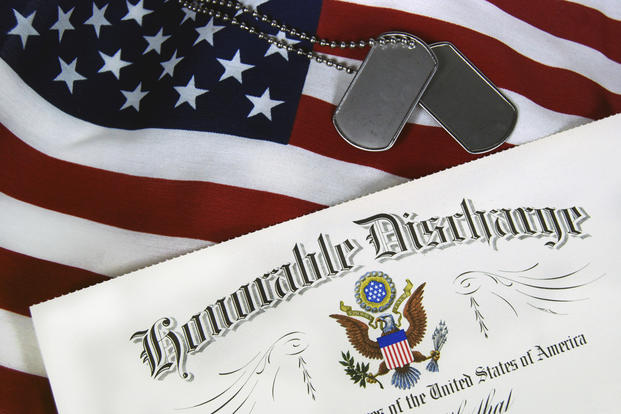Service members who leave the military with an honorable discharge are eligible for a variety of veterans benefits, as long as other eligibility requirements are met. These benefits include educational assistance, health care, home loans and more.
An honorable discharge means you've met or exceeded the standards of conduct and performance expected of you during your time in the military.
It is the highest form of discharge a service member can receive and is considered a recognition of honorable and faithful service. It reflects a service member's dedication and proper conduct during their time of service.
If you complete your military service in a satisfactory manner, or if you're discharged early through no fault of your own (such as medical reasons or changes in the military's needs), your characterization probably will be honorable.
What Is an Honorable Discharge?
To qualify for an honorable discharge, service members must have not only completed their enlistment or contract time commitment and other obligations, but they must have done so in a satisfactory manner. This means maintaining high standards of conduct, duty performance and discipline during their service. Any infractions or disciplinary issues can jeopardize an honorable discharge.
An honorable discharge can include either voluntary or involuntary separation, or general discharge. It generally applies when a service member reaches the end of his or her enlistment, experiences a medical obstacle or other hardship, or fails training within the first six months. Most medical or disability discharges are characterized as honorable.
Depending on the circumstances, a marginal performer may obtain an honorable discharge. A service member can be considered a marginal performer in cases of substandard personal behavior or performance, a failure to maintain acceptable standards or an inability to adapt to military service.
Honorable Discharge Benefits
An "honorable" discharge is a point of pride and a symbol of integrity for veterans, carrying significant weight in both civilian life and the veteran community. Any deviation from this designation can impact a veteran's eligibility for certain benefits and privileges.
These benefits include:
- VA disability compensation benefits: Veterans who suffer from a disease or injury as a result of their active military service may receive tax-free payments.
- VA health-care benefits: Health care is free for conditions related to military service and for veterans with "catastrophic disabilities" and disability ratings of at least 50%. Other veterans may receive care with a co-pay that still can save them money. versus traditional health insurance plans on the open market. Additionally, the PACT Act expands access to VA health care and benefits for veterans exposed to burn pits and other toxic substances.
- Education benefits: Veterans can receive help under the GI Bill, which can cover tuition, housing and other educational expenses; as well as choosing a career. In some cases, GI Bill benefits can be transferred to a dependent or surviving spouse.
- VA home loans: Veterans with an honorable discharge may qualify for VA home loans, offering favorable terms and lower interest rates for home purchases.
- Employment opportunities: Many employers highly value the discipline and skills acquired during military service, making honorable discharge veterans attractive candidates in the job market.
Additional honorable discharge benefits include:
- VA life insurance benefits: Several programs are available, tailored to the unique needs of veterans and their families.
- Burial benefits: Generally, an honorably discharged service member may receive Defense Department or VA funeral and burial benefits. At a minimum, military funeral honors consist of at least two service members present at the service, ceremonial folding and presentation of the U.S. flag to the next of kin, and playing of taps.
- Veteran Readiness and Employment (VR&E): This program helps veterans with service-connected disabilities prepare for, find and maintain suitable employment.
- State-specific benefits: Varying from state to state, they can include property tax exemptions, education and employment assistance, specialized license plates, access to state veterans' homes and more.
- Access to military installations: Certain categories of veterans and their eligible family members can retain access to military installations, commissaries and exchange facilities. Specific eligibility criteria and the extent of access can vary between military installations and may change over time. Veterans and eligible individuals should check with the specific installation or base they wish to visit for the most updated information on access policies.
- Adaptive housing grants: Veterans with certain disabilities may qualify for grants to adapt their homes to accommodate their needs.
Read More: Your 2023 State Veteran Benefits
Do You Receive Separation Pay for an Honorable Discharge?
You may be eligible for separation pay if you meet all of the following criteria:
- You have finished your first term of enlistment or period of obligated service
- You have at least six years of service
- You are separating involuntarily
- You are not yet eligible for retirement
- You are not separating under adverse conditions
If you receive separation pay and then file for VA disability benefits, you must repay all your separation pay before you receive any disability compensation from the VA.
It's important for service members to review their individual contracts and consult with their unit's administrative or personnel office for specific information regarding their separation and any potential benefits or entitlements.
Read More: Involuntary Separation Pay
Other Military Discharge Types
Not all discharges are honorable. Other discharge types include:
- General discharge: May be given for service members whose performance and conduct do not meet the highest standards but still generally meet military requirements.
- Other than honorable discharge: The most severe nonpunitive discharge, it's typically reserved for service members who have committed serious offenses or misconduct.
- Dishonorable discharge: Reserved for individuals convicted by a court-martial of the most serious offenses, it carries severe legal consequences and a loss of most veteran benefits.
For most people, anything other than an honorable or general discharge is considered a "bad paper discharge," because that one piece of paper (the DD214) can spell bad news for their future.
Read More: Understanding The Types of Military Discharge
Know All Your Legal Rights and Benefits
Be aware and get what you are entitled to. Keep up with all the legal benefits available to you as a service member, veteran or spouse and get updates delivered straight to your inbox by subscribing to Military.com.













